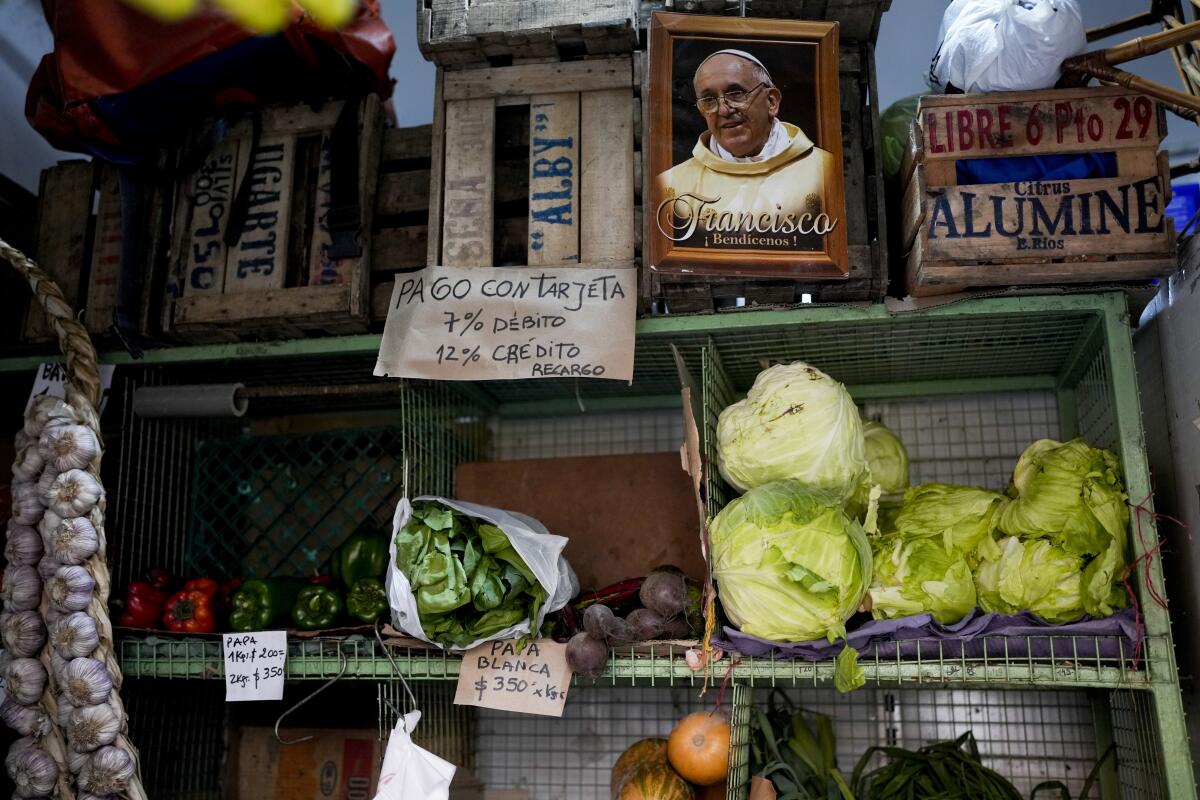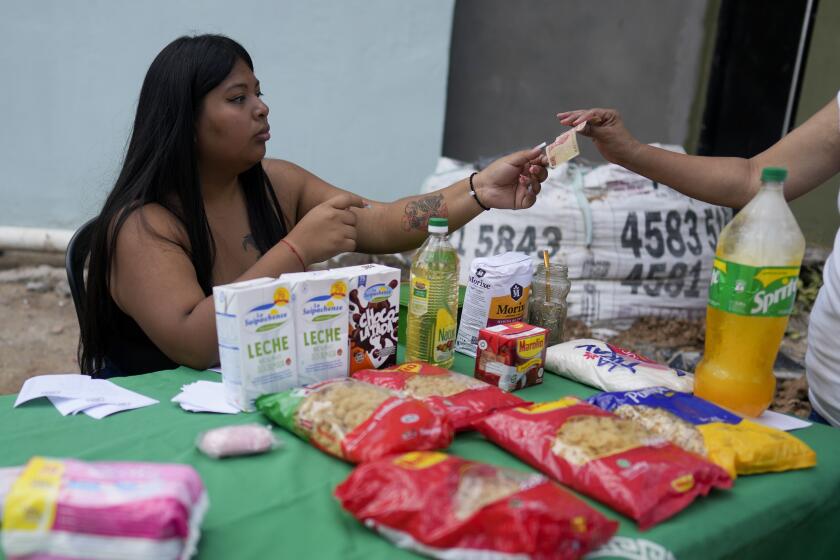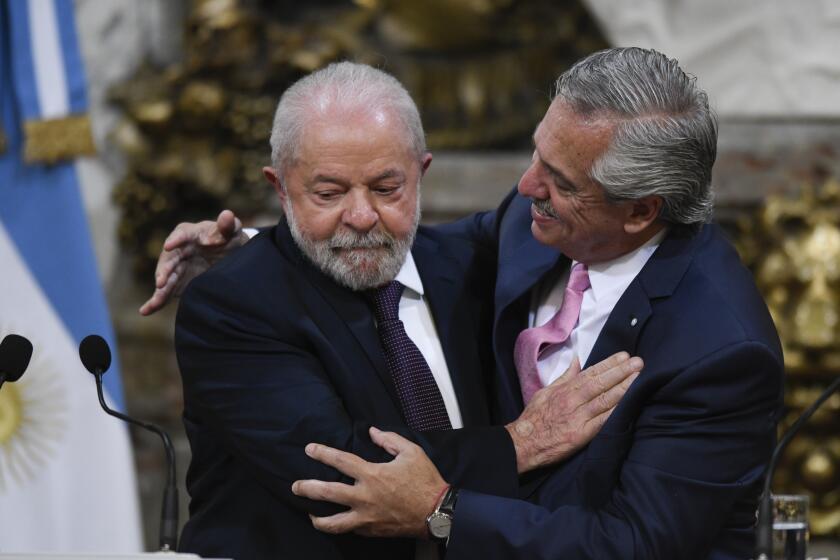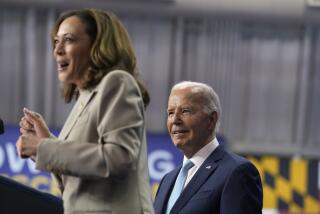Inflation in Argentina leaves families struggling to feed themselves

BUENOS AIRES — Gimena Páez could barely pay her bills.
Then inflation in Argentina started rising faster. The value of the country’s currency plunged, making most goods nearly unobtainable. Getting enough food for herself and her 11-year-old daughter became a daily struggle.
Inflation has been a problem across the world, but Argentina is second in a World Bank ranking of countries with the highest food inflation. On Friday, Argentina’s state-run INDEC statistics agency said that the inflation in food prices over the 12 months ending in April was 115%. That has been topped only by Lebanon, with 352%.
Life was never easy for the neighbors of Nueva Pompeya, a lower-middle-class neighborhood where Páez lives at the southern end of Argentina’s capital.
These days, for many in Argentina, paying bills and getting to the end of the month have taken a backseat to a more basic problem: getting enough to eat.
Argentina’s annual inflation rate has surpassed 100% a year. The price of food has increased even faster, leading many to rely on soup kitchens to get at least one hearty meal a day.
Before the COVID-19 pandemic, Páez managed to make ends meet as a street vendor. She was forced to sell everything amid strict quarantine measures, and now spends much of her time trying to figure out how to feed her daughter.
Millions of Argentines are struggling to make ends meet as their country’s annual inflation rate clocked in at a staggering 102.5% in February.
“Sometimes I don’t eat so I can save a little bit of food for my daughter at night, or I eat rice or something else,” Páez, 43, said at one of the soup kitchens in her neighborhood. “It is very distressing not being able to provide your children with what they need.”
Susana Martínez, 47, who works at the soup kitchen, is one of those questioning how much longer the situation can last before there’s upheaval.
At least 4 in 10 Argentines, and 54% of children under 15, are poor, according to the INDEC.
“I think that there is going to be a social explosion. This can’t go on much longer,” Martínez said. “The rope is very, very tight.”
Consumer prices in Argentina soared 8.4% in April from the previous month, while food prices increased 10.1%, the INDEC said Friday.
In the first four months of the year, consumer prices increased 32%, and food prices soared 41.2%, according to the INDEC. Annual inflation reached 108.8% in April.
“Before the pandemic, the people who came here were the most vulnerable,” said Evelyn Morales, who is in charge of the soup kitchen operated by the Socialist Workers’ Party. “But now it’s the people who live in this neighborhood who come to get food.”
Argentines, who lived as well as the Italians and the French a few decades ago, face a staggering prospect: The minimum wage by the end of June could be worth $10 a month--less than that of Haiti, the world’s poorest country.
Martínez recently had surgery for carpal tunnel syndrome, which she has after years of giving massages.
The pain has been so unbearable that she went back to the doctor, who gave her a prescription for an injection.
“He gave me the prescription and said, ‘Well, buy it.’ And I said, ‘I don’t have enough money to buy it,’” Martínez said. “I could use [the money] to buy a yogurt for my daughter.”
Martínez is tired of saying no whenever Valentina, her 7-year-old daughter, asks for anything.
“Going to the supermarket really depresses me, and it makes you feel powerless when you have kids,” Martínez said.
She has stopped taking Valentina to a kids’ amusement area because there are too many temptations that she can’t afford, like cotton candy and balloons.
“I’m not going to take her because she won’t have a good time,” Martínez said.
President Alberto Fernández’s administration has been struggling to put the brakes on the country’s soaring inflation rate.
In December, Economy Minister Sergio Massa said his goal was for monthly inflation to decelerate to 3% by April.
That now seems like it was a pipe dream.
Market analysts are reacting with deep skepticism to a proposal floated by the leaders of Brazil and Argentina to launch a common currency.
“We have a very serious problem with inflation, very difficult to manage,” Fernández said in a radio interview Friday. “We have to stop it; we have to figure out how to do it.”
Argentines are no strangers to inflation in part due to the government’s penchant for printing money to finance spending, which accelerated during the pandemic.
Now, prices are also being pushed higher due to a punishing drought and a sharp depreciation of the local currency in financial markets last month amid stringent capital controls.
The government has tried to reduce the impact of rising prices through price controls that have largely failed, and may mask the real rate of food inflation for the poorest members of society.
In the first four months of the year, the price of food increased an average of 10.5% per month in small stores in Buenos Aires suburbs, where most people in the poorest neighborhoods do their shopping, according to research by the Institute of Social, Economic, and Citizen Policy Research.
Argentina’s inflation rate is bound to be a key issue in the presidential election in October. Fernández has said he will not seek reelection.
Associated Press journalists Almudena Calatrava and Victor R. Caivano contributed to this report.
More to Read
Sign up for Essential California
The most important California stories and recommendations in your inbox every morning.
You may occasionally receive promotional content from the Los Angeles Times.












